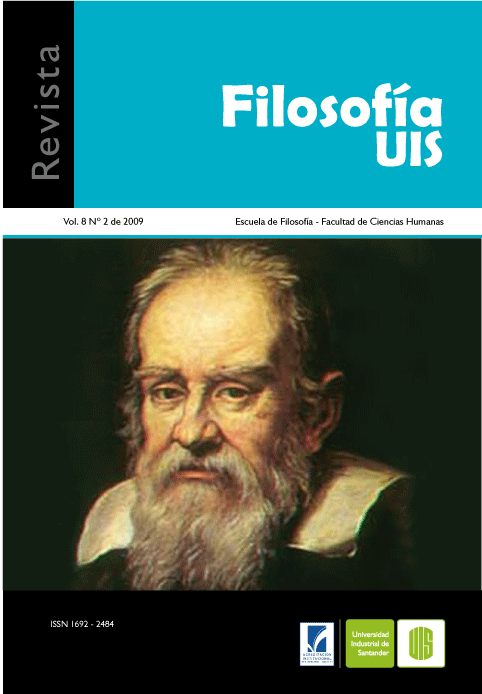From established philosophy to itinerant philosophical thought: the debate on pluralism as a philosophical policy of decentering
Published 2009-12-16
Keywords
- Decentering,
- pluralism of visions of the world,
- civic,
- politic,
- critical or informative
- legislative,
- cultural inclusive ...More
How to Cite
Copyright (c) 2009 Monica Marcela Jaramillo

This work is licensed under a Creative Commons Attribution 4.0 International License.
Abstract
If reflection on pluralism can only be made as an invocation, call, recognition and inclusion of the absent other, it should also be developed on the basis of the plurisemic meanings of the term pluralism and based on the experience of being present in the world, by virtue of an attitude of vigilance that opens the way to another way of conceiving the activity of the philosopher as itinerant thought. This is the reason why reflection on pluralism requires, on the part of the philosopher, a radical and vital experience of openness, as well as decentering, uprooting and de-immunization, that is, a thought that refuses all forms of purism and ideocratic and self-referential attitude, with respect to itself, to the other and to the world.
Downloads
References
- Anderson, Benedict (2006), Comunidades imaginadas. Reflexión sobre el origen y difusión de los nacionalismos, Traducción de Eduardo I. Suárez, México, F.C.E.
- Appiah, Kwame Anthony (2007), Cosmopolitismo. La ética en un mundo de extraños, Traducción de Lilia Mosconi, Buenos Aires, Katz.
- Aristóteles (1988), Política, libro II, Traducción de Manuela García Valdés, Madrid, Gredos.
- Aristóteles (1999), Retórica, libro I, Traducción de Quintín Racionero. Madrid, Gredos.
- Bauman, Zygmunt (2005), Modernidad y ambivalencia, Barcelona, Anthropos.
- Bauman, Zygmunt (2006), Comunidad. En busca de seguridad en un mundo hostil, Traducción de Jesús Alborés, Madrid, Siglo XXI.
- Broch, Hermann (1985), Création littéraire et connaissance, Traducción de Albert Khon, Paris, Gallimard.
- Derrida, Jacques (1997), Le droit à la philosophie du point de vue cosmopolitique, Paris, éditions UNESCO.
- Derrida, Jacques (1997), Mal de archivo. Una impresión freudiana, Traducción de Paco Vidarte, Madrid, Trotta.
- Deleuze, Gilles (1994), “Michel Tournier y el mundo sin el otro”, Lógica del sentido, Barcelona, Paidós, pp. 305-306.
- Jankélévitch, Vladimir (1990), Lo puro y lo impuro. Madrid, Taurus Humanidades.
- Husserl, Edmund (1989), La philosophie comme science rigoureuse, Traducción de Marc B. De Launy, Paris, P.U.F.
- Husserl, Edmund (1988), Renovación del hombre y de la cultura, capítulo III, Traducción de Agustín Serrano de Haro, Barcelona, Anthropos.
- Husserl, Edmund (2001) Sur l’intersubjetivité I, apéndice LIV, Traducción de Natalie Depraz, Paris, P.U.F., A.
- Husserl, Edmund (2001 B), Sur l’intersubjectivité II, sección IV, apéndices VII, XIX, Traducción de Natalie Depraz, Paris, P.U.F.
- Heidegger, Martin (1997), Ser y Tiempo, capítulo quinto, traducción de Jorge Eduardo Rivera, Santiago de Chile, Editorial Universitaria.
- Kant, Emmanuel (1964), Anthropologie du point de vue pragmatique, libro I, Traducción de Michel Foucault, Paris, J. Vrin.
- Nietzsche, Friedrich (1999), Sobre la utilidad y el perjuicio de la historia para la vida [II Intempestiva], prefacio, Traducción de Germán Cano, Madrid, Biblioteca Nueva.
- Touraine, Alain (2001), ¿Qué es la democracia?, Traducción de Horacio Pons, México, FCE.
